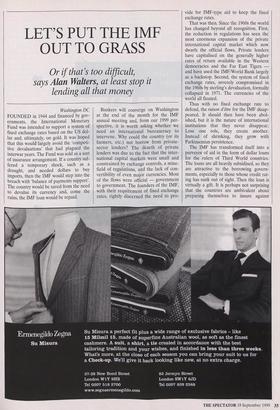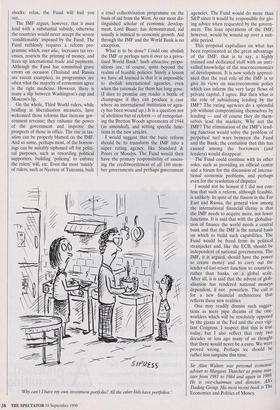LET'S PUT THE IMF OUT TO GRASS
Or if that's too difficult, lending all that money
Washington DC FOUNDED in 1944 and financed by gov- ernments, the International Monetary Fund was intended to support a system of fixed exchange rates based on the US dol- lar and, ultimately, on gold. It was hoped that this would largely avoid the 'competi- tive devaluations' that had plagued the interwar years. The Fund was sold as a sort of insurance arrangement. If a country suf- fered a temporary shock, such as a drought, and needed dollars to buy imports, then the IMF would step into the breach with 'balance of payments support'. The country would be saved from the need to devalue its currency and, come the rains, the IMF loan would be repaid. Bankers will converge on Washington at the end of the month for the IMF annual meeting and, from our 1999 per- spective, it is worth asking whether we need an international bureaucracy to intervene. Why could the country (or its farmers, etc.) not borrow from private- sector lenders? The dearth of private lenders was due to the fact that the inter- national capital markets were small and constrained by exchange controls, a mine- field of regulations, and the lack of con- vertibility of even major currencies. Most of the flows were official — government to government. The founders of the IMF, with their requirement of fixed exchange rates, rightly discerned the need to pro- vide for IMF-type aid to keep the fixed exchange rates.
That was then. Since the 1960s the world has changed beyond all recognition. First, the reduction in regulations has seen the most enormous expansion of the private international capital market which now dwarfs the official flows. Private lenders have capitalised on the generally higher rates of return available in the Western democracies and the Far East Tigers and have used the IMF/World Bank largely as a backstop. Second, the system of fixed exchange rates, severely compromised in the 1960s by sterling's devaluation, formally collapsed in 1971. The currencies of the world all floated.
Thus with no fixed exchange rate to defend, the raison d'être for the IMF disap- peared. It should then have been abol- ished, but it is the nature of international institutions that they never disappear. Lose one role, they create another. Instead of shrinking, they grow with Parkinsonian persistence.
The IMF has transformed itself into a purveyor of aid in the form of dollar loans for the rulers of Third World countries. The loans are all heavily subsidised, so they are attractive to the borrowing govern- ments, especially to those whose credit rat- ing has sunk out of sight. Then the loan is virtually a gift. It is perhaps not surprising that the countries are ambivalent about preparing themselves to insure against shocks: relax, the Fund will bail you out.. • The IMF argues, however, that it must lend with a substantial subsidy, otherwise the countries would never accept the severe `conditionality' imposed by the Fund. The Fund ruthlessly requires a reform pro- gramme which, inter alia, increases tax rev- enues, restricts the printing of money, and frees up international trade and payments. Although the Fund has committed grave errors on occasion (Thailand and Russia are recent examples), its programmes are often what the majority of economists agree is the right medicine. However, there is many a slip between Washington's cup and Moscow's lip.
On the whole, Third World rulers, while bridling at liberalisation measures, have welcomed those reforms that increase gov- ernment revenue; they enhance the power of the government and improve the prospects of those in office. The rise in tax- ation can be properly blamed on the IMF. And so some, perhaps most, of the borrow- ings can be suitably siphoned off for politi- cal purposes, such as rewarding political supporters, building 'policing' to enforce the rulers' will, etc. Even the most 'saintly' of rulers, such as Nyerere of Tanzania, built a cruel collectivisation programme on the basis of aid from the West. As our most dis- tinguished scholar of economic develop- ment, Lord Bauer, has demonstrated, aid usually is inimical to economic growth. Aid through the IMF and the World Bank is no exception.
What is to be done? Could one abolish the IMF or perhaps turn it over to a priva- tised World Bank? Such attractive propo- sitions are, of course, quite beyond the realms of feasible policies. Surely a lesson we have all learned is that it is impossible to abolish international agencies, even when the rationale for them has long gone. (I dare to promise any reader a bottle of champagne if they can produce a case where an international institution or agen- cy has been wound up.) It is a question not of abolition but of reform — of renegotiat- ing the Bretton Woods agreements of 1944 (as amended), and setting specific func- tions in the new articles.
I would suggest that the basic reform should be to transform the IMF into a super rating agency, like Standard & Poors or Moodys. The Fund would then have the primary responsibility of assess- ing the creditworthiness of all 160 mem- ber governments and perhaps government 'Why can't I have my own investment portfolio? All the other kids have portfolios.' agencies. The Fund would do more than S&P since it would be responsible for giv- ing advice when requested by the govern- ment. The loan operations of the IMF, however, would be wound up over a suit- able period.
This proposal capitalises on what has been represented as the great advantage of the IMF: that is to say, a highly trained and dedicated staff with an unri- valled knowledge of the macroeconomics of development. It is now widely appreci- ated that the real role of the IMF is to give its views on macroeconomic policy which can inform the very large flows of private capital. I agree. But then what is the role of subsidising lending by the IMF? The rating agencies do a splendid job without compromising themselves by lending — and of course they do them- selves lead the markets. Why not the IMF? The elimination of the IMF's lend- ing function would solve the problem of perpetual turf wars between the Fund and the Bank; the confusion that this has caused among the borrowers (and lenders) would disappear.
The Fund could continue with its other roles, such as providing an official centre and a forum for the discussion of interna- tional economic problems, and perhaps even for the resolution of disputes I would not be honest if I did not con- fess that such a reform, although feasible, is unlikely. In spite of the fiascos in the Far . East and Russia, the general view among the international financial clerisy is that the IMF needs to acquire more, not fewer functions. It is said that with the globalisa- don of finance the world needs a central bank and that the IMF is the natural basis on which to build such capabilities. The Fund would be freed from its political straitjacket and, like the ECB, should be independent of national governments. The IMF, it is argued, should have the power to create money and to carry out the lender-of-last-resort function to countries, rather than banks, on a global scale. After all, it is said that the advent of glob- alisation has rendered national moneys dependent, if not powerless. The call is for a new financial architecture that reflects these new realities One may readily dismiss such sugges- tions as mere pipe dreams of the one- worlders which will be resolutely opposed by the giants at the Fed and the ever vigi- lant Congress. I suspect that this is true today, but I also reflect that only two decades or less ago many of us thought that there would never be a euro. We were proved wrong. Perhaps we should be rather less sanguine this time.
Sir Alan Walters was personal economic adviser to Margaret Thatcher as prime mm- ister from 1981 to 1984 and again in 1989. He is vice-chairman and director, AIG Trading Group. His most recent book is The Economics and Politics of Money.



























































































 Previous page
Previous page